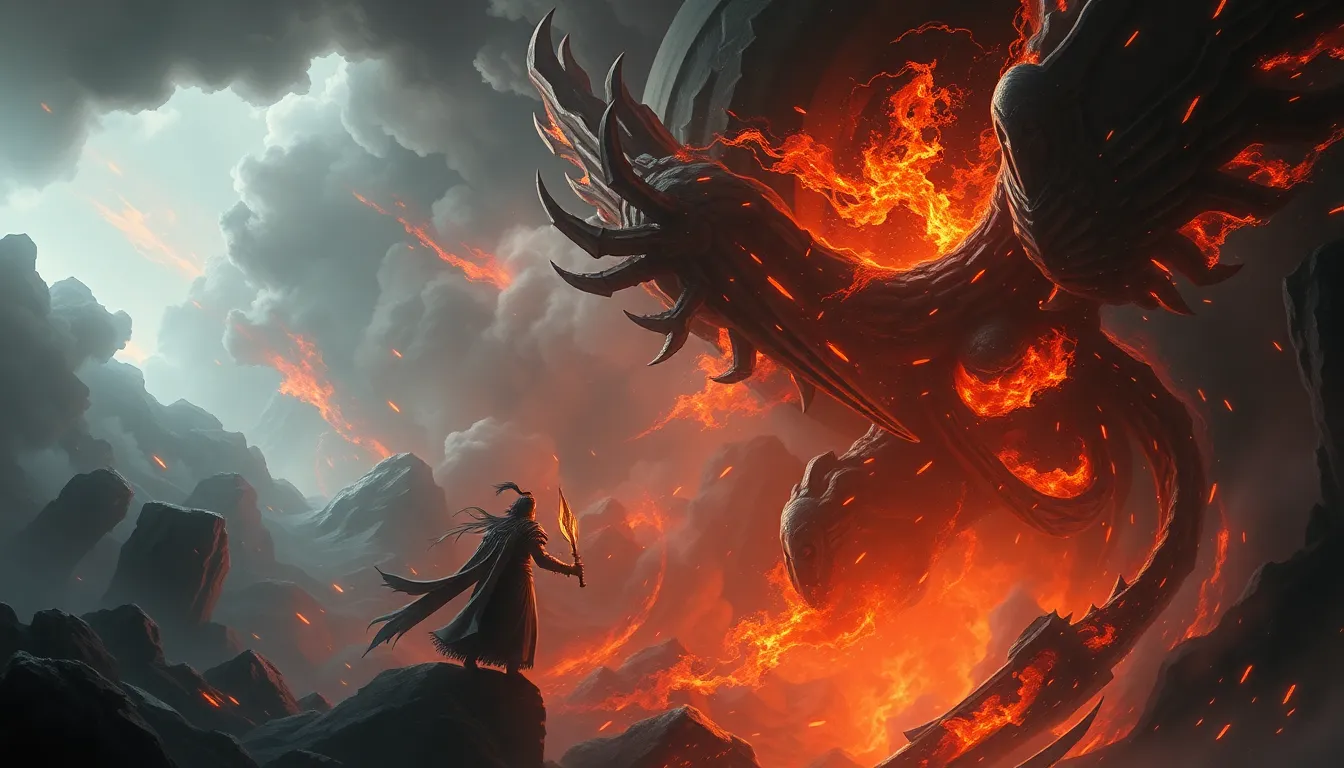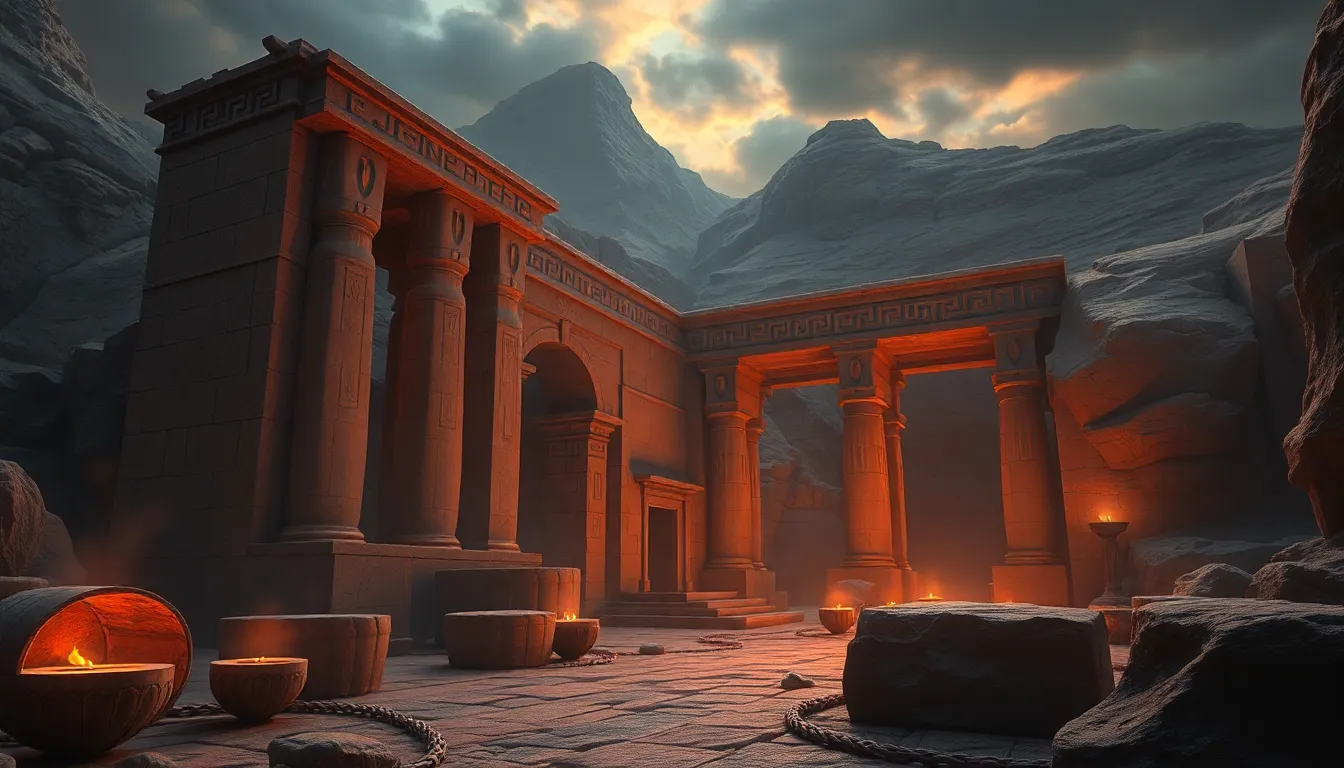The Wrath of the Gods: Legendary Tales of Divine Retribution
I. Introduction to Divine Retribution
Divine retribution is a recurring theme in mythology, representing the punishment inflicted by the gods on mortals who defy divine laws or moral order. This concept is pivotal across various cultures, serving as a cautionary tale about the consequences of hubris, disobedience, and moral corruption.
The importance of this theme lies in its role as a moral compass, guiding societies in their understanding of justice and ethics. Through divine retribution, myths convey profound lessons about the balance of power between the divine and the mortal realms. In this article, we will explore legendary tales from different cultures that illustrate the wrath of the gods and the lessons learned from these narratives.
II. Ancient Greek Myths: The Fury of the Olympians
Greek mythology is rich with stories of gods, goddesses, heroes, and mortals, where the Olympian gods reign supreme. Each deity has distinct personalities, often reflecting human emotions and moral dilemmas.
A. Overview of Greek mythology and the pantheon of gods
The Greek pantheon includes well-known gods such as Zeus, Hera, Poseidon, and Athena, each embodying various aspects of life and human experience. Their interactions with mortals often illuminate themes of justice, vengeance, and the consequences of defiance.
B. Case Study: The Punishment of Prometheus
Prometheus, a Titan, defied Zeus by stealing fire from the gods and giving it to humanity. As punishment, Zeus condemned him to eternal torment, having an eagle eat his liver daily, which would regenerate each night. This myth serves as a powerful reminder of the consequences of overstepping divine boundaries.
C. Case Study: The Wrath of Hera against Heracles
Hera, the queen of the gods, harbored a deep resentment towards Heracles, the son of Zeus and a mortal woman. Driven by jealousy, she imposed numerous trials upon him, including the infamous Twelve Labors. This tale illustrates the themes of vengeance and the complexities of divine relationships.
D. Themes of justice and vengeance in Greek tales
The tales of Greek mythology often emphasize the themes of justice and the pursuit of vengeance. The gods are portrayed as both protectors of moral order and enforcers of punishment, demonstrating that divine retribution is inextricably linked to the concept of justice.
III. Norse Mythology: The Vengeance of the Aesir
Norse mythology presents a worldview shaped by fate, inevitability, and the constant struggle between order and chaos. The Aesir, the principal pantheon of gods, embody various aspects of life and the human condition.
A. Introduction to Norse gods and their worldview
The Norse gods, including Odin, Thor, and Loki, are complex figures whose narratives often revolve around themes of heroism, betrayal, and the consequences of one’s actions. Their stories are steeped in the belief that fate governs all, even the gods themselves.
B. Case Study: Loki’s Punishment and the Binding of Fenrir
Loki, the trickster god, faced dire consequences for his misdeeds, particularly after the death of Baldr. The gods captured him and bound him with the entrails of his own son, while a serpent dripped venom onto his face. This punishment underscores the theme of justice meted out by the divine for betrayal and chaos.
C. Case Study: The Consequences of Baldr’s Death
Baldr’s death marked a turning point in Norse mythology, leading to a series of events that culminated in Ragnarok, the end of the world. His demise was avenged by his mother, Frigg, and the gods, illustrating the cyclical nature of vengeance and retribution.
D. The role of fate and inevitability in Norse tales
Norse mythology frequently explores the concept of fate, suggesting that even the gods are bound by it. This creates a narrative tension where divine retribution is inevitable, reinforcing the idea that actions have consequences that transcend even divine power.
IV. Hindu Epics: The Balance of Dharma and Karma
Hindu mythology is rich with deities and epic tales that explore the concepts of dharma (moral duty) and karma (the law of cause and effect). These narratives often highlight the moral implications of actions and their repercussions.
A. Overview of Hindu mythology and divine beings
Hindu mythology features a vast array of gods, including Vishnu, Shiva, and Durga, each representing different aspects of existence. The epics of the Mahabharata and Ramayana are central to understanding the complexities of divine justice.
B. Case Study: The Destruction of Ravana in the Ramayana
Ravana, the demon king, abducted Sita, the wife of Lord Rama. Rama’s quest to rescue Sita culminated in a fierce battle where Ravana was ultimately defeated. This tale emphasizes the triumph of dharma over adharma (unrighteousness) and the divine retribution that follows moral transgressions.
C. Case Study: The Curse of the Pandavas and its repercussions
The Pandavas, central figures in the Mahabharata, faced numerous trials due to a curse placed upon them. Their journey illustrates the complexities of karma, showcasing how past actions can lead to divine retribution and the quest for redemption.
D. The moral implications of retribution in Hindu beliefs
In Hindu beliefs, divine retribution is not merely punishment; it serves as a mechanism for restoring balance and justice. The narratives emphasize the importance of upholding dharma and the inevitable consequences of straying from it.
V. Egyptian Myths: The Justice of Ma’at
Egyptian mythology revolves around the concept of Ma’at, representing truth, balance, and cosmic order. The divine beings in this pantheon enforce these principles, ensuring that order prevails over chaos.
A. Introduction to the Egyptian pantheon and the concept of Ma’at
The Egyptian pantheon includes gods such as Osiris, Isis, and Set, each playing a role in maintaining Ma’at. The mythology emphasizes the importance of harmony and the consequences of violating this order.
B. Case Study: The Punishment of Set for Osiris’s Death
Set, the god of chaos, murdered his brother Osiris in a bid for power. In retribution, Osiris’s son, Horus, avenged his father’s death, ultimately leading to Set’s defeat. This myth underscores the theme of duality between chaos and order.
C. Case Study: The Judgment of the Dead in the Underworld
In the afterlife, the deceased are judged by Osiris and the weighing of their hearts against the feather of Ma’at. This judgment determines their fate, reflecting the importance of moral conduct and the belief in divine justice.
D. The significance of order and chaos in Egyptian mythology
Egyptian mythology illustrates the constant struggle between order and chaos, with divine retribution serving as a means to restore balance. The gods’ actions reflect the belief that maintaining Ma’at is essential for cosmic stability.
VI. Mesopotamian Legends: Wrath of the Deities
Mesopotamian mythology is rich with narratives that explore the characteristics of its gods, who often embody the forces of nature and human experience. The tales illustrate the gods’ wrath and the consequences of human actions.
A. Overview of Mesopotamian gods and their characteristics
The Mesopotamian pantheon includes deities such as Enlil, Inanna, and Marduk, each representing various elements of life and nature. Their stories often reflect the complexities of human existence and divine retribution.
B. Case Study: The Flood Myth and the Anger of Enlil
In the Epic of Gilgamesh, Enlil unleashes a great flood to cleanse the earth of humanity’s wickedness, demonstrating the wrath of the gods against moral corruption. This myth serves as a reminder of the consequences of human actions and the desire for divine justice.
C. Case Study: The Punishment of Gilgamesh and the Quest for Immortality
Gilgamesh, a demigod, embarks on a quest for immortality after the death of his friend Enkidu. His journey reflects the struggle against mortality and the acknowledgment of the limits imposed by the divine, culminating in the realization that immortality is reserved for the gods.
<h




